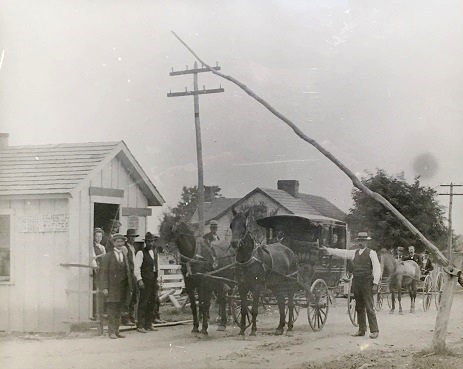| Home |

| Photo of the Month May 2024 |
| See Previous Photos Unknown Faces and Places |
 |
| Courtesy Fort Necessity National Battlefield - National Park Service |
The National Turnpike, also known as the National Road and the National Highway, was our nation's first east-to-west super highway. Before the advent of the Interstate Highway System after World War II, it was "the only highway of its kind ever wholly constructed by the government of the United States," writes Thomas B. Searight in his 1894 book, The Old Pike: A History of the National Road. It was signed into law by President Thomas Jefferson and constructed between 1811 and 1837 as federal funds were available.
This photograph shows the toll gate of the Road at Hopwood, Fayette County, PA, an image on permanent exhibit at the Fort Necessity National Battlefield of the National Park Service. The keeper at this gate for many years, at the base of Chestnut Ridge of the Allegheny Mountains, was Perry Greene White, husband of Mariah Minerd.
Writes Searight, "From the time it was thrown open to the public, in the year 1818, until the coming of railroads west of the Allegheny mountains, in 1852, the National Road was the one great highway over which passed the bulk of trade and travel, and the mails between the East and the West. Many of the most illustrious statesmen and heroes of the early period of our national existence passed over the National Road from their homes to the capital and back, at the opening and closing of the sessions of Congress." Among them were Presidents Andrew Jackson, William Henry Harrison, James Polk and Zachary Taylor as well as Congressman Henry Clay, Sam Houston, Davy Crockett and many more.
Early in his career in the early 1840s, our Perry was a construction and maintenance contractor on the road. At some point, while digging at the Turkey's Nest -- a steep section with a large stone wall supporting a bridge -- he uncovered a buried box that contained numerous coins and a gold dollar. A memoir written by one of his granddaughters, published in the 1912 book Genealogical and Personal History of Fayette and Greene Counties, said that:
Everyone knew and respected Brother White. He was a real devout Christian, belonging to the old stone Methodist church on the cemetary hill, which has been torn down for so long now. I have heard my mother (Hessie Goff) tell how when the minister called on Brother White for prayer, in the church, he would pray the 90th Psalm. He was always "ready" for the Lord.
From about 1864 to his death 22 years later, Perry was employed tollgate keeper at Hopwood. The work gave him "general satisfaction," said the Uniontown Genius of Liberty. On the fateful day of Jan. 22, 1886, he went to work as usual. He came home at 4 p.m. and "fell into a stupor, from which he could not be aroused, and continued in that condition until his death" two days later, said the Genius."Before becoming unconscious..., he experienced strong and lively hopes of a glorious immortality." Another description of his death states that after coming home and having his dinner, he said to his wife, " 'Mother, I think I will go upstairs and rest a bit.' So, after a while she thought he had been up there long enough, and when she went up he had passed away in his sleep." Today his grave marker at Hopwood Cemetery still stands and is very legible.
|
Copyright © 2024 Mark A. Miner |
